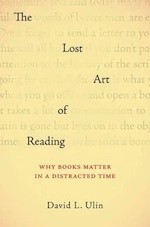
David L. Ulin
The Lost Art of Reading: Why Books Matter in a Distracted Time
(Sasquatch Books, October 2010)
Reading is a revolutionary act, an act of engagement in a culture that wants us to disengage. In The Lost Art of Reading, David L. Ulin asks a number of timely questions – why is literature important? What does it offer, especially now? Blending commentary with memoir, Ulin addresses the importance of the simple act of reading in an increasingly digital culture. Reading a book, flipping through hard pages, or shuffling them on screen – it doesn’t matter. The key is the act of reading, and it’s seriousness and depth. Ulin emphasizes the importance of reflection and pause allowed by stopping to read a book, and the accompanying focus required to let the mind run free in a world that is not one’s own. Are we willing to risk our collective interest in contemplation, nuanced thinking, and empathy? Far from preaching to the choir, The Lost Art of Reading is a call to arms, or rather, to pages.
“Expanding on a 2009 essay, Ulin, former book review editor of the Los Angeles Times, addresses the act of reading and its place in our information overloaded age. Ulin relies mainly on his own experiences as a loyal reader–specifically a recent attempt to reread The Great Gatsby alongside his son Noah’s high school English class–which goes devastatingly wrong (‘You’d fail if you were in my class,’ Noah pronounces). Ulin uses this incident to frame the larger narrative, fluently addressing the art and craft of literature, the reader’s participation, the writer and the writing–and the act of rereading. He addresses in greater depth distractions from reading, specifically the ever-present seductions of technology, and the experience of reading on a screen. Moving toward an optimistic note, Ulin argues that technology can enlarge us, citing Rick Moody and Jennifer Egan as writers who embrace this ever-changing landscape. Ulin’s short book not only puts forth a strong and passionate case for reading but also compiles a reading list of writers and critics (e.g., Anne Fadiman, Joan Didion, David Shields) who have influenced Ulin and who are well worth reading.”
—Publisher’s Weekly
“As the media focus on the business of e-books, ardent readers ponder the effects electronic devices are having on what and how we read and the viability of literary culture. Ulin, book critic at the Los Angeles Times, confesses to his own changed reading habits as he partakes of ‘the instant gratifications of the information stream’ in this thoughtful, candid, and gratifyingly balanced inquiry. He writes with surpassing eloquence and insight about what books have meant to him since childhood, his son’s reading of The Great Gatsby and his own rereading of Fitzgerald’s masterpiece, and how books ‘serve as a collective soul, a memory bank, bigger than mere commerce.’ Quoting Thomas Paine, Kerouac, Vonnegut, and Didion, Ulin is wisely open-minded in his grappling with the growing complexity and attendant ambiguity of our changing approaches to writing and reading, creating a genuinely reflective and resonant chapter in the story of the book. And his closing vision of a ‘quiet revolution’ in which reading ‘is an act of resistance in a landscape of distraction’ is most inspiriting.”
—Booklist
